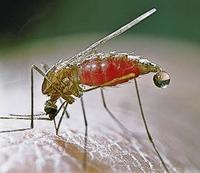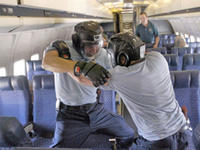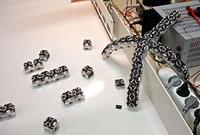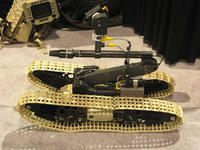-
Artificial volcanoes to reverse global warming

British scientists are investigating a method to reverse the effects of climate change by creating an artificial volcano and suspending it 12.5 miles above the earth; the team’s goal is to recreate the cooling effect that a volcano has when it releases millions of tiny particles into the stratosphere that bounce some of the Sun’s rays back into space
-
-
Breakthrough in hydrogen fuel cells

Hydrogen makes a great fuel because it can be converted easily to electricity in a fuel cell and because it is carbon free; the downside of hydrogen is that, because it is a gas, it can only be stored in high pressure or cryogenic tanks; a team of USC scientists has developed a robust, efficient method of using hydrogen as a fuel source
-
-
Wake Tech uses grant funding to expand law enforcement education
North Carolina-based Wake Tech Community College received grants of more than $2.5 million in the 2010-2011 fiscal year; the money was used, among other things, to develop training programs in the latest cybercrime and latent evidence technologies and to add a new, state-of-the-art crime lab to its public safety training facility
-
-
Identifying bad guys in a crowd
New CCTV technology aims to do two things: for post-incident forensic analysis the system retraces a person’s steps after they have left a site; and for real-time analysis the system alerts security to immediate or imminent threats; researchers say the technology will also address privacy concerns: if a computer could automatically detect and preserve footage “of interest,” the images of the rest of the people captured by CCTVs can be safely deleted, minimizing the invasion to privacy
-
-
Uncovering mechanisms key to fusion reactor walls
A new tool will be hitched to an experimental fusion reactor at Princeton University to learn precisely what happens when extremely hot plasmas touch and interact with the inner surface of the reactor; fusion powers the stars and could lead to a limitless supply of clean energy
-
-
The malaria mosquito is disappearing – researchers wonder why

The incidence of malaria in many African countries south of the Sahara is falling rapidly; a research group has discovered that the mosquito carrying the malaria parasite has practically disappeared from villages without organized mosquito control; there are several hypotheses about the cause of the decline, but without proper data researchers cannot say whether malaria is being eradicated or whether it is just resting up before returning with renewed vigor
-
-
Common bacterium stops mosquitoes from transmitting Dengue virus
Strains of a bacterium commonly found in fruit flies can prevent the Aedes aegypti mosquito from transmitting the virus that causes dengue fever, researchers have found; the discovery could lead to a more effective way to control dengue worldwide
-
-
San Jose halts gang violence, ends ICE partnership

Two months after it began its alliance with immigration officials to crack down on gang violence, the San Jose Police Department in California announced that it was ending its partnership with the U.S. Immigration and Customs Enforcement (ICE) agency; on 24 June, two ICE agents stepped in to help San Jose which was struggling to contain its highest murder rate in twenty years
-
-
Flood prediction tech simulates rivers 100x faster than real time
Researchers have applied advanced analytics to river systems, weather, and sensor data, to predict the Guadalupe River’s behavior more than a hundred times the normal speed; simulating thousands of branches at a time, this technology could help provide up to several days warning of a flood, allowing more time for disaster prevention and preparedness
-
-
New training facility features simulated bus, air, and rail stations

On Tuesday DHS Secretary Janet Napolitano was in Brunswick, Georgia for the grand opening of a sophisticated new $5.3 million counter-terrorism training center for law enforcement officials; the 22,000 square-foot facility features several simulation areas including a mock bus terminal, subway station, and an airport terminal
-
-
Enhancing communication of swarming robots

With the help of computer simulations and prototypes, researchers are striving to enhance the communication in human and multi-robot interactions
-
-
DARPA seeks to build interstellar space ship in 100 years

The Pentagon’s advanced research arm is currently exploring the technology to build a spaceship capable of travelling to distant stars in the next 100 years; the Defense Advanced Research Projects Agency (DARPA) plans on awarding as much as $500,000 in seed money this fall to the company with the most promising ability to develop interstellar travel
-
-
Antenna-equipped garments here
To make communications devices more reliable, researchers are working on incorporating radio antennas directly into clothing, using plastic film and metallic thread; the new antenna design has a range four times larger than that of a conventional antenna worn on the body — one that is used by American soldiers today
-
-
Researchers developing graffiti analysis app
Law enforcement officials could soon have an app for their mobile phones that allows them to snap a picture of gang graffiti and have its meaning translated; gangs often use graffiti as a way of communicating messages like challenges or warnings to rival gangs and understanding its meaning could help fight crime
-
-
Micro Unmanned Ground Vehicle helps soldiers, first responders

Weighing just over ten pounds, Dragon Runner 10 (DR10) is small enough to carry in an assault pack and rugged enough to throw into buildings and hostile environments; the DR10 has multiple sensor and payload options, and thus is suitable for reconnaissance and surveillance missions to support small military units, patrols, and first responder teams
-
More headlines
The long view
New Technology is Keeping the Skies Safe
DHS S&T Baggage, Cargo, and People Screening (BCP) Program develops state-of-the-art screening solutions to help secure airspace, communities, and borders
Factories First: Winning the Drone War Before It Starts
Wars are won by factories before they are won on the battlefield,Martin C. Feldmann writes, noting that the United States lacks the manufacturing depth for the coming drone age. Rectifying this situation “will take far more than procurement tweaks,” Feldmann writes. “It demands a national-level, wartime-scale industrial mobilization.”
How Artificial General Intelligence Could Affect the Rise and Fall of Nations
Visions for potential AGI futures: A new report from RAND aims to stimulate thinking among policymakers about possible impacts of the development of artificial general intelligence (AGI) on geopolitics and the world order.
Smaller Nuclear Reactors Spark Renewed Interest in a Once-Shunned Energy Source
In the past two years, half the states have taken action to promote nuclear power, from creating nuclear task forces to integrating nuclear into long-term energy plans.
Keeping the Lights on with Nuclear Waste: Radiochemistry Transforms Nuclear Waste into Strategic Materials
How UNLV radiochemistry is pioneering the future of energy in the Southwest by salvaging strategic materials from nuclear dumps –and making it safe.
Model Predicts Long-Term Effects of Nuclear Waste on Underground Disposal Systems
The simulations matched results from an underground lab experiment in Switzerland, suggesting modeling could be used to validate the safety of nuclear disposal sites.
